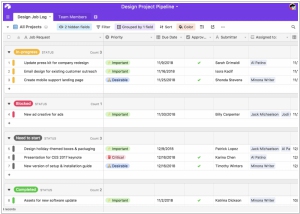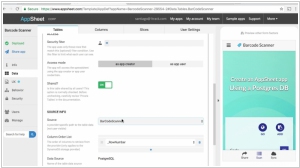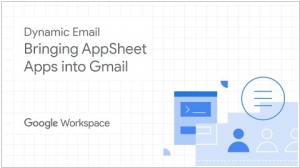Airtable vs AppSheet
October 12, 2021 | Author: Michael Stromann
Airtable and AppSheet are both no-code/low-code platforms for building custom applications, but they have some key differences:
Data Structure and Management: Airtable is primarily a visual database and spreadsheet-like tool that allows users to create custom databases with tables, fields, and records. It provides a flexible and intuitive interface for creating, organizing, and managing data. AppSheet, on the other hand, is more focused on creating mobile apps that leverage data from various sources, including spreadsheets, databases, and APIs. It provides a more structured approach to defining data models and relationships.
Application Development Approach: Airtable offers a more visual and drag-and-drop interface for building applications, where users can create custom views, forms, and automations without writing code. It provides a wide range of pre-built templates and integrations with popular tools. AppSheet, on the other hand, provides a more form-based and rule-driven approach to building applications, where users define data sources, workflows, and UI elements using a combination of forms and expressions.
Mobile App Development: While both Airtable and AppSheet allow users to create mobile applications, AppSheet is specifically designed for creating mobile apps that work offline, have native-like performance, and can be published to app stores. AppSheet provides a more comprehensive set of mobile-specific features, such as support for device sensors, offline data sync, and app store deployment, which makes it more suitable for creating mobile applications compared to Airtable.
Custom Logic and Automation: AppSheet provides more advanced capabilities for defining custom logic and automation in applications. It allows users to define expressions and workflows using its own formula language and automation features, which provides more flexibility in creating custom business logic and automating workflows. Airtable, on the other hand, offers limited automation capabilities through its built-in automations or integrations with other tools, but may not be as robust as AppSheet in terms of custom logic and automation options.
Integrations: Both Airtable and AppSheet offer integrations with popular third-party tools, but AppSheet has a broader range of integrations and connectors to various data sources, including databases, cloud storage, APIs, and more. This makes AppSheet more versatile in terms of data connectivity and integration capabilities compared to Airtable.
Pricing: Airtable offers both free and paid plans, with pricing tiers based on usage and features. AppSheet also offers free and paid plans, but its pricing model is based on the number of app users, with additional features available in higher-priced plans. The pricing structure and features offered by each platform may vary, and organizations should carefully review and compare the pricing options of both Airtable and AppSheet based on their specific requirements.
In summary, the main differences between Airtable and AppSheet include their approach to data structure and management, application development approach, focus on mobile app development, custom logic and automation capabilities, integrations, and pricing. Organizations should consider their specific needs and requirements when evaluating and choosing between these two no-code/low-code platforms for building custom applications.
See also: Top 10 Low-Code Platforms
Data Structure and Management: Airtable is primarily a visual database and spreadsheet-like tool that allows users to create custom databases with tables, fields, and records. It provides a flexible and intuitive interface for creating, organizing, and managing data. AppSheet, on the other hand, is more focused on creating mobile apps that leverage data from various sources, including spreadsheets, databases, and APIs. It provides a more structured approach to defining data models and relationships.
Application Development Approach: Airtable offers a more visual and drag-and-drop interface for building applications, where users can create custom views, forms, and automations without writing code. It provides a wide range of pre-built templates and integrations with popular tools. AppSheet, on the other hand, provides a more form-based and rule-driven approach to building applications, where users define data sources, workflows, and UI elements using a combination of forms and expressions.
Mobile App Development: While both Airtable and AppSheet allow users to create mobile applications, AppSheet is specifically designed for creating mobile apps that work offline, have native-like performance, and can be published to app stores. AppSheet provides a more comprehensive set of mobile-specific features, such as support for device sensors, offline data sync, and app store deployment, which makes it more suitable for creating mobile applications compared to Airtable.
Custom Logic and Automation: AppSheet provides more advanced capabilities for defining custom logic and automation in applications. It allows users to define expressions and workflows using its own formula language and automation features, which provides more flexibility in creating custom business logic and automating workflows. Airtable, on the other hand, offers limited automation capabilities through its built-in automations or integrations with other tools, but may not be as robust as AppSheet in terms of custom logic and automation options.
Integrations: Both Airtable and AppSheet offer integrations with popular third-party tools, but AppSheet has a broader range of integrations and connectors to various data sources, including databases, cloud storage, APIs, and more. This makes AppSheet more versatile in terms of data connectivity and integration capabilities compared to Airtable.
Pricing: Airtable offers both free and paid plans, with pricing tiers based on usage and features. AppSheet also offers free and paid plans, but its pricing model is based on the number of app users, with additional features available in higher-priced plans. The pricing structure and features offered by each platform may vary, and organizations should carefully review and compare the pricing options of both Airtable and AppSheet based on their specific requirements.
In summary, the main differences between Airtable and AppSheet include their approach to data structure and management, application development approach, focus on mobile app development, custom logic and automation capabilities, integrations, and pricing. Organizations should consider their specific needs and requirements when evaluating and choosing between these two no-code/low-code platforms for building custom applications.
See also: Top 10 Low-Code Platforms
Airtable vs AppSheet in our news:
2021. Google brings AppSheet automations to Gmail
Google has introduced a new feature for its AppSheet automation service, enabling developers on its no-code platform to create custom apps and automation that directly interact with Gmail. Through dynamic email, developers now have the ability to construct applications that users can trigger and execute directly from their Gmail inbox. Although dynamic email was announced by Google in 2019, we haven't witnessed a significant number of developers fully utilizing these capabilities. This enhancement allows AppSheet developers to build functionalities such as approval workflows or asset management systems that users can conveniently update within an email itself.
2020. Google binds no-code tools, API management into new Business Application Platform
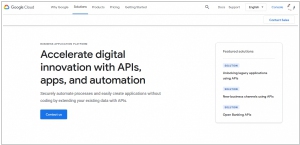
In a strategic move to tap into the thriving low-code/no-code market, Google LLC has introduced its new category of software called the Business Application Platform. This comprehensive platform encompasses various components, including application programming interface (API) management, no-code application development, process automation, and business analytics. Leveraging the technology obtained through its recent acquisition of AppSheet, Google aims to simplify the application-building process by enabling users to create applications without the need for coding, distinguishing it from traditional low-code solutions. The Business Application Platform will also incorporate API management capabilities from Apigee, a company acquired by Google four years ago. Google plans to enhance the platform with additional features that leverage the power of Google Cloud, hybrid and multicloud architectures, artificial intelligence and machine learning development tools, lifecycle management, as well as security and productivity/collaboration functionalities.
2020. Airtable raises $185M and launches new low-code and automation features
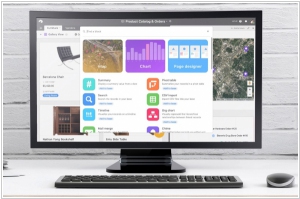
The no-code platform and spreadsheet-centric database, Airtable, has successfully raised $185 million in a Series D funding round. Alongside this milestone, the company is introducing new low-code features, automation capabilities (reminiscent of IFTTT for Airtable), and enhanced data management functionalities. While Airtable's pre-built blocks previously allowed users to incorporate maps, Gantt charts, and other features into their tables, there comes a point where the built-in functionality may not meet all user requirements, necessitating the need for custom tools (referred to as an "escape valve" by Liu, Airtable's CEO). To address this, Airtable has introduced Airtable Apps, enabling more advanced users to build additional functionality using JavaScript. Furthermore, users have the option to share their custom capabilities with others through the newly introduced Airtable Marketplace. These developments empower Airtable users to create more sophisticated and tailored solutions to meet their specific needs.
2020. Google App Maker is shutting down

Google has announced the gradual discontinuation of Google App Maker due to its low usage. The process of phasing out App Maker began in 2020, and it will be officially shut down on January 19, 2021. For those who relied on App Maker to automate business processes, Google recommends transitioning to AppSheet, a newly introduced addition to its application development portfolio that offers similar capabilities. In the case of app development, Google suggests utilizing App Engine, which provides a fully managed platform for building and deploying applications. Additionally, for data collection purposes, Google Forms is recommended, as it now offers numerous new features that were not available when App Maker was initially launched.
2020. Google buys no code application development startup AppSheet
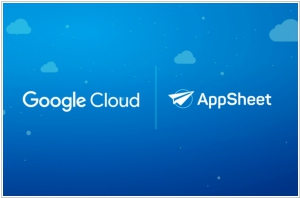
Google strengthens its cloud capabilities through the acquisition of Appsheet, a company that offers tools empowering "citizen developers" to build data-driven applications. Appsheet provides a "no code" platform for application development, enabling Google to assist companies in creating mobile apps without the need for extensive developer teams. The platform extracts data from sources like spreadsheets and utilizes field and column names as the foundation for new applications. With its existing integration with Google products such as Sheets and Forms, Appsheet was an enticing choice for Google. Furthermore, the platform seamlessly collaborates with other renowned services including Amazon Web Services Inc.'s DynamoDB database, Box, Salesforce, and Microsoft Office 365. Google has assured that Appsheet will continue to support these platforms even after the completion of the acquisition.

